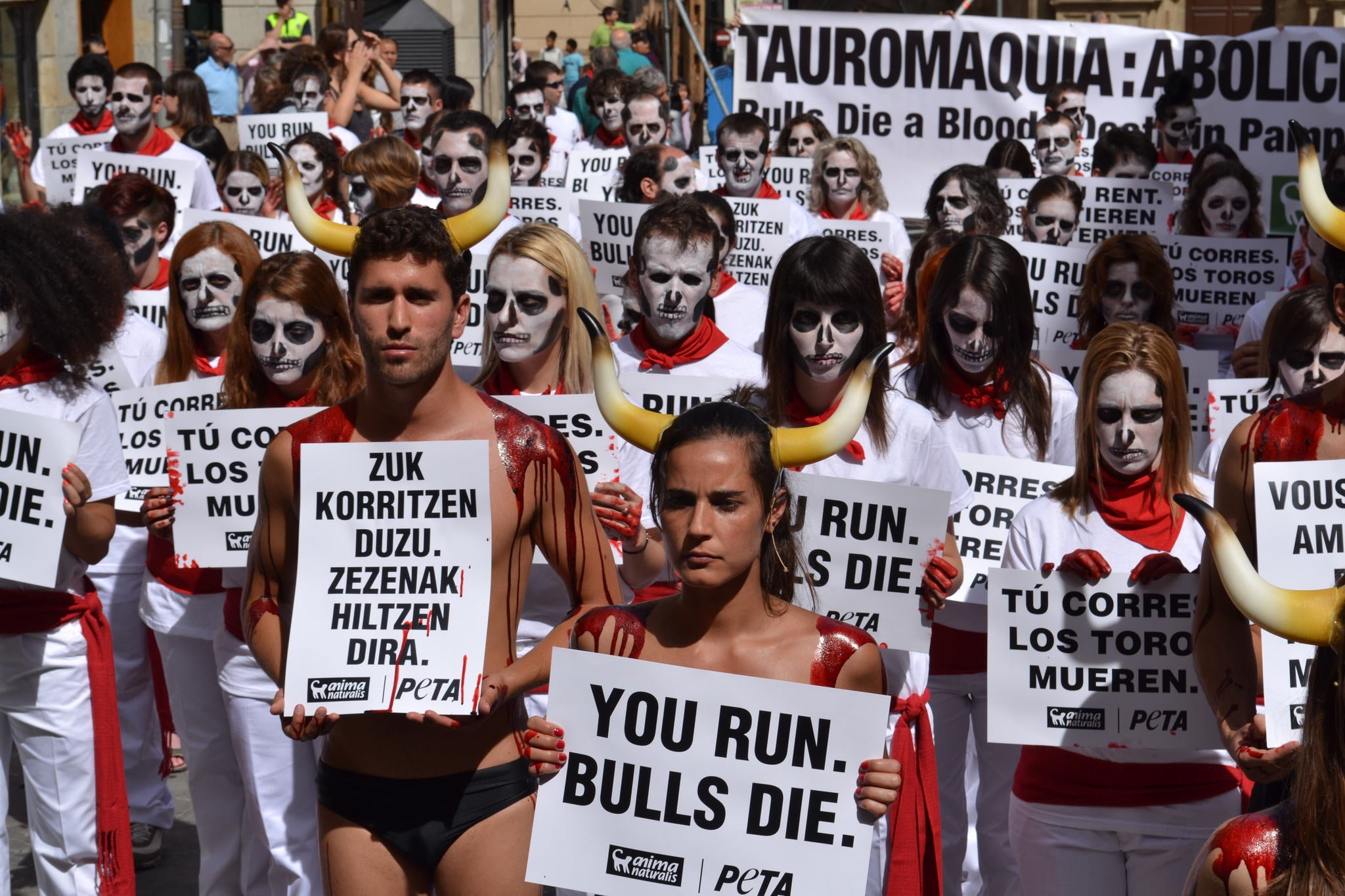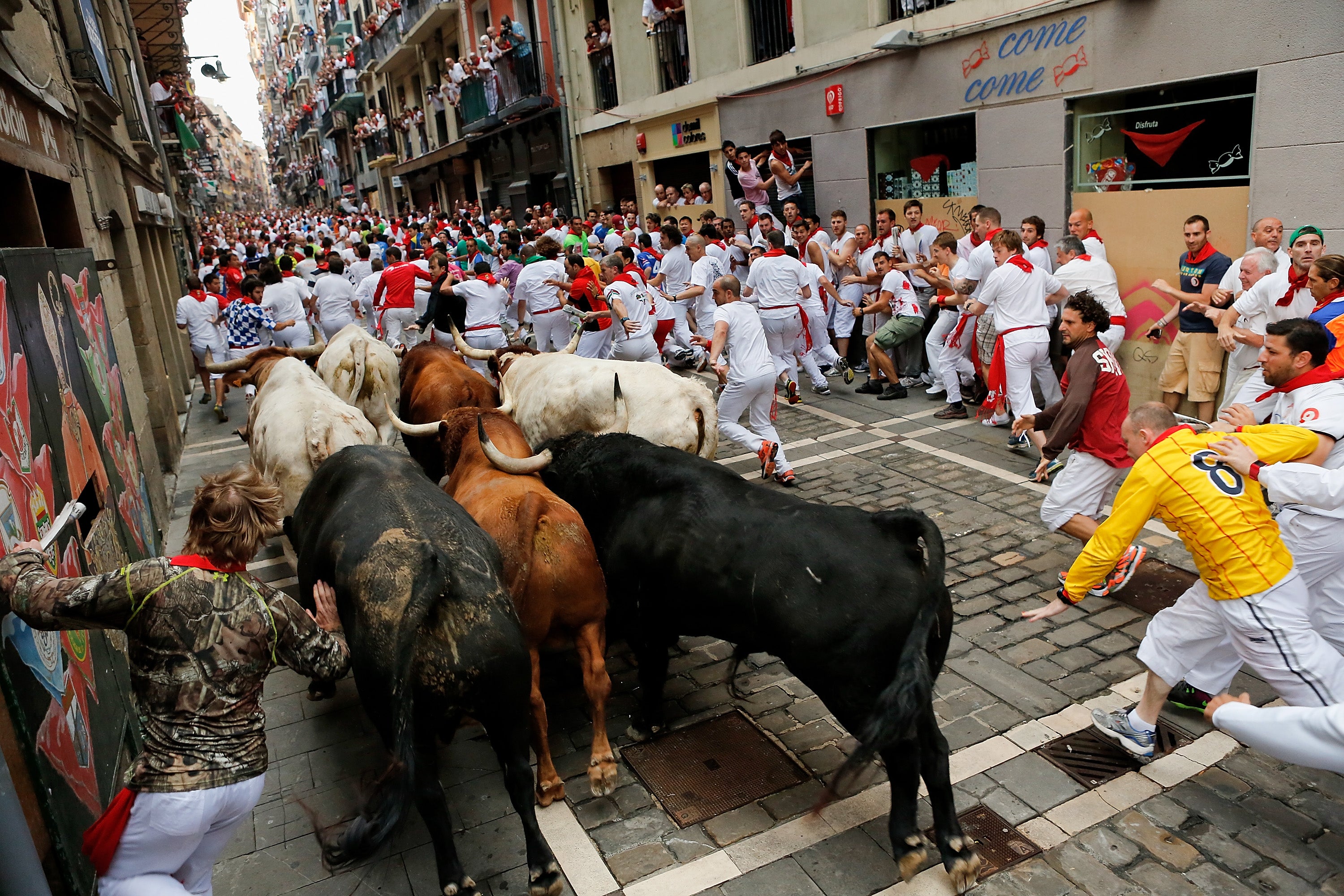Running of the Bulls protest: Animal rights campaigners demonstrate in Pamplona ahead of festival
The annual bull running event and subsequent bullfight is part of the San Fermin festival which gets underway tomorrow

Your support helps us to tell the story
From reproductive rights to climate change to Big Tech, The Independent is on the ground when the story is developing. Whether it's investigating the financials of Elon Musk's pro-Trump PAC or producing our latest documentary, 'The A Word', which shines a light on the American women fighting for reproductive rights, we know how important it is to parse out the facts from the messaging.
At such a critical moment in US history, we need reporters on the ground. Your donation allows us to keep sending journalists to speak to both sides of the story.
The Independent is trusted by Americans across the entire political spectrum. And unlike many other quality news outlets, we choose not to lock Americans out of our reporting and analysis with paywalls. We believe quality journalism should be available to everyone, paid for by those who can afford it.
Your support makes all the difference.Tourists cannot attend northern Spain’s annual bull running event without being complicit in the “unnecessary and archaic” murder of defenceless animals, campaigners have said, as they stage a protest against the tradition.
More than 150 activists descended on Pamplona’s main square today ahead of the nine-day San Fermin festival and its heavily criticised Running of the Bulls.
Protesters, garbed in the festival’s traditional uniform of white clothing and red Pañuelico scarf, daubed themselves in fake blood and held signs that read in numerous languages: “You Run. Bulls Die.”
Their faces were also painted to look like the Grim Reaper in order to, protesters say, remind the thousands of tourists that what may seem like harmless fun actually results in the bulls being “repeatedly speared and stabbed before the matador attempts to sever the exhausted animal’s spine with a dagger.”

People for the Ethical Treatment of Animals (Peta) and Spanish animal welfare organisation AnimaNaturalis organised the demonstration.
The Running of the Bulls is a tradition that dates back to the Middle Ages, when the cattle had to be herded through the streets en route the bullring where they would be killed for food.
Though bullfighting was banned in Catalonia in 2012, partly as a result of the region’s desire to separate itself culturally from the rest of Spain, it is still allowed elsewhere in the country.
The argument on whether bullfighting, for all its historic value, has a place in Spain’s future has been raging for many years.
Kirsty Henderson, Peta campaign coordinator, said that while many nationalities made up the demographic of the activists, a ban on the tradition is also being fervently sought by Spaniards.
“The tide is really turning on bull fighting. It’s not a tradition that Spanish people want to protect any more,” she told The Independent. “Bullrings are closing.”
“It’s very hard to claim it’s a Spanish tradition,” Ms Henderson added, referring to the amount of tourists that make up a large part of the visiting audience.
“The only reason it’s still going as an industry is because of tourism. The vast majority of people who attend this event are tourists who do not understand what happens to the bulls at the end.
“You cannot attend this event as a tourist thinking it’s just a bit of fun without lending your support to the way the bulls are violently killed. It’s so unnecessary. It’s archaic.”
The running is open to anyone above the age of 18 and its participants are primarily made up of men, though women do take part.
A local travel agent says six bulls, each weighting 500kgs or more, will provide ample challenge for fearful runners battling the bulls on a route spanning roughly 850m. There have reportedly been 15 deaths since records began just over a century ago.
Peta isn’t the only charity calling for the end of the tradition. British charity The League Against Cruel Sports has entreated travel firm STA to end its package deals to the festival.
The organisation says that supplying tours to the event only keeps the “cruel and barbaric practices” alive.
Joe Duckworth, Chief Executive of the League said: “Tourism plays a major part in the continuation of bullfighting and the exploitation of the animals, who are simply being abused and killed for entertainment is truly shocking.
“As rightly pointed out by ABTA, travel companies have a responsibility to the welfare of animals in tourism, a responsibility that can no longer be shirked - which is why we want to see 2014 as the last year STA support this abhorrent activity.”
Ms Henderson echoed this view and said that the bulls are kept in darkness prior to the race so that they’re blinded by the sunlight when it begins.
Peta, which organises a protest each year, also claimed that a recent poll showed that 76 per cent of Spanish people have no interest in bullfights.
“I have no doubt that [the tradition] will end given the support. People were crying here today at the protest. It is absolutely driven by passionate Spanish people who want to see this outlawed in this country,” she said.
This year’s festival runs from 6-14 July.
Join our commenting forum
Join thought-provoking conversations, follow other Independent readers and see their replies
Comments